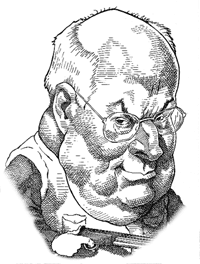Rainville on Iraq: Pay No Attention to Your Television Screens, For They Lie
Ordinarily, VDB is relatively slow to anger, and relatively quick to cool.
Because political blogging is a hard road anyway — with many potholes full of countless sharp rocks and glass shards that will wedge themselves under your toenails and make you bleed for a week and a day — and anger tends to sap your energy.
And so as far as the Rainville campaign goes, VDB has been amused, dismayed, flabbergasted, occasionally impressed, occasionally disgusted, but never once actually angry.
Until yesterday.
Why? After months of criticism for her studied opacity on the War in Iraq — far and away the most pressing issue in this election cycle — Martha offered this reponse in yesterday’s Channel 17 debate with Mark Shepard:
“A very important element has been missing, and that is good communication on what’s going on there… It’s very difficult for citizens to have an accurate perspective of the war, of our successes… Part of that is, I believe, the fault of all of those involved for not communicating more openly with Americans, or not telling the story of what’s going on in Iraq.”
 Of course, this response is a tepid version of the “Why doesn’t the media report the good news from Iraq” talking point that Republicans have been airing nationally for well over two years now.
Of course, this response is a tepid version of the “Why doesn’t the media report the good news from Iraq” talking point that Republicans have been airing nationally for well over two years now.
It could easily have been Donald Rumsfeld or Sean Hannity speaking.
And in that, it’s hardly surprising: Rainville has elected to run on an entire series of such talking points, from the War to the deficit to tax cuts.
But when you strip it down, this particular talking point lies at the deepest heart of Republican up-is-downism. Because what it demands of the American people — or Vermonters, in this case — is that they cease trusting what they see on their televisions, what they hear on their radios, what they manage to put together by reading their newspapers.
It demands that they trust an official, minority report on the state of the world — and that, of course, is the definition of totalitarian propaganda.
This talking point would make sense if half the media in the world was awash in positive images from Iraq, and somehow those images were being denied us.
But the undeniable fact of the matter is that every media organization on the globe is reporting that Iraq is a disaster because by every measure available to us — from electricity production to the number of insurgent attacks to the number of cross-border attacks being staged by Iran and Turkey to the weekly corpse counts from Baghdad morgues — Iraq is not merely a disaster but an unmitigated disaster.
That is reality, as assembled and agreed to by everyone in the entire known world with the notable exceptions of the Bush Administration, a desperate national Republican leadership, and the tame media outlets they’ve nurtured.
And so the question “Why doesn’t the media report the good news from Iraq?” is not really a plea for balance and objectivity, as it appears to be, but the reverse: a gentle nudge toward a state of affairs in which Americans disregard foreign media services, disregard competent battlefield reporting by any American media outlets in deviation from the official story.
This is the same sort of night-is-day effort that brought us the administration’s two standard official lines on rising violence “metrics”: first, we predicted that violence would increase, and therefore the surges in violence actually vindicate our view of the war; and second, attacks are a sign of desperation, a sign that the insurgents know they’re facing imminent defeat, and hence increased attacks are actually a sure sign of victory.
Rainville no doubt thought she was just buying a moment’s time when hit with the $64,000 question; debaters often use a bit of boilerplate to think through something a little more complicated.
But it was more than that, a great deal more. It was direct evidence that Rainville — for all her insistence on being a different kind of Republican — has internalized the most far-reaching and dangerous of the talking points associated with the Bush era: that the State, and its media, should be trusted to create Reality.
 Which is fine for George Bush. He’s yet to attend a funeral for a soldier killed in Iraq.
Which is fine for George Bush. He’s yet to attend a funeral for a soldier killed in Iraq.
And for Dick Cheney, who hasn’t attended a funeral and who insists that hotel televisions be pre-tuned to Fox News when he does venture out of the secure undisclosed.
But Martha Rainville has stood next to the caskets, she’s seen the creeping stop-loss and the involuntary recall of the Individual Ready Reserve, she’s personally implemented the administration’s shocking overuse of the National Guard.
She claims to care.
That’s why the talking points about how well things are going in Iraq are doubly insulting, doubly infuriating tripping from the lips of Martha Rainville.
Because she damn well knows better.